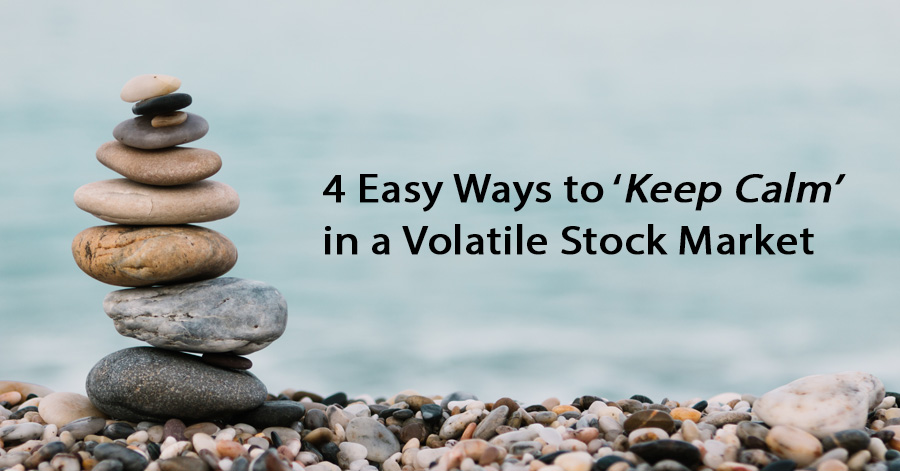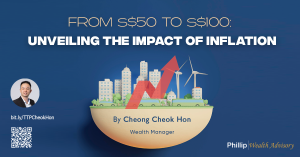4 Easy Ways to ‘Keep Calm’ in a Volatile Stock Market April 7, 2020

The global COVID-19 pandemic and the oil price war between Saudi Arabia and Russia spiraled the global stocks markets to extreme losses, with oil prices experiencing its biggest fall in three decades. As investors around the world are suffering from the double whammy of these 2 global ramifications, we would like to help you with four ways to keep calm during this volatile period:
1. Do Not Panic
Rapid price movements from major catastrophic events are not uncommon.
As evidenced by the following events – infamous Black Monday Crash of 1987, Asian Financial Crisis of 1997, September 11 World Trade Center attacks in 2001, Financial Crisis of 2008 and the more recent Global Market Downturn of 2018,[1] stocks tend to move wildly in the short term as the world assesses new information in view of the latest events and reprice companies accordingly.
According to Benzinga[2], there have been 27 S&P 500 corrections of between 10 and 20 percent since the end of 1945. In other words, in the past 73 years, a correction similar to the experience of the current market has occurred roughly once every 2.6 years.
Market chaos are inevitable. While many will rush to make snap decisions, we encourage investors to pause, consider and make decisions with a long-time horizon in mind.
2. Make sure you are financially stable
While many may sell shares of excellent companies blindly at bad prices without a plan due to panic and fear; you should ensure that your financial well-being is in order and not over-extend. Strong holding power will help you to avoid panic selling, which could result in unnecessary losses.
Do not leverage, over-extend and buy into the dip if you cannot afford to lose that money. This will reduce your holding power and you may be forced to close your position at a bad price. It is important to be financially stable while you accumulate your portfolio.
3. Watch your stop-loss levels
The simplest way to avoid an investment catastrophe is to apply a stop-loss strategy for your stocks. It gives you an exit strategy, limits your downside risk and takes your emotions out of investing. For example, an investor who had set a 15% stop loss level for his stocks will exit and sell his stocks if it goes down 15% from its original purchase price. You do not want to be stuck in a bad investment thinking “one day, it will turn around” because you could end up holding the stock for years despite the continuous fall in prices. In the worst-case scenario, you could go bust.
The stop-loss strategy differs from the previously mentioned plan where investors sell stocks blindly without a plan. Investors following a stop-loss level willingly follow a plan and strategy.
It is important to have a stop-loss level that you adhere to as it helps you preserve your capital so you can get back into the market once the panic subsides. Stop loss measure is one of the simplest way to avoid an investment catastrophe. Please do follow your stop loss levels when they are triggered. Investors who are trading short term may use a tighter stop loss level.
Alternatively, investors who see value may want to accumulate and adopt dollar cost averaging using our recurring order placement. More information can be found at https://www.poems.com.sg/rsp/#faq-rp
4. Portfolio insurance
Insurance may not be for all but it does pay to invest a little in insurance and in this case, we are talking about owning a fair bit of gold as portfolio insurance.
Gold will not wither away from inflation like a fiat currency and it carries no risk of default like a bond, nor can it go bankrupt like a company. Hence, gold is a constant in our global economy that is highly unlikely to go worthless.
Even as stock prices fall, gold tends to hold its ground and more often than not, rallies as investors flee the markets. Gold prices also generally go up as stock prices go down, given their inverse relationship. For instance, gold prices tripled during the 1973 Arab oil embargo and caused the U.S. stock market to crash and the economy going into recession.
Throughout history, during a stock market crash, soaring inflation, imploding governments and other black swan events, people flock to gold as it is the perfect insurance to have in any of your portfolio. Kindly revisit our article A Good Time for Gold, where we shared on the reasons to buy gold as well as some recommended Gold ETFs.
Based on past experiences, we should be able to tide over the current crisis. If everyone takes a step back from the media panic and stay calm, we can foresee better days ahead. We expect the rest of the global markets to have a recovery in the coming months, though not anytime soon. Get yourself prepared on the 3 possible scenarios of this COVID-19 outbreak and stay calm.
[1] https://en.wikipedia.org/wiki/List_of_stock_market_crashes_and_bear_markets
[2] https://www.benzinga.com/analyst-ratings/analyst-color/18/12/12859176/putting-the-2018-market-correction-in-perspective
About the author
Mr Roger Chan
Roger holds a Business Degree in Electronic Commerce from the Monash University and is also the recipient of the Golden Key Scholarship Award for outstanding academic performance. He currently heads the Global Markets Night Trading team assisting clients with the US and European markets. Prior to the night desk, he was a bond trader at the Debt Capital Markets desk and brings with him a wealth of equity and debt market knowledge. Outside work, he trains and is an active competitor in the martial art of Brazilian Jiu-Jitsu. He finishes at the podium frequently and is also the 2015 Pan Asian BJJFP champion. His other interests include chess and reading.

 Back in Business: The Return of IPOs & Top Traded Counters in March 2024
Back in Business: The Return of IPOs & Top Traded Counters in March 2024  From $50 to $100: Unveiling the Impact of Inflation
From $50 to $100: Unveiling the Impact of Inflation  How to soar higher with Positive Carry!
How to soar higher with Positive Carry!  Why 2024 Offers A Small Window of Opportunity and How to Position Yourself to Capture It
Why 2024 Offers A Small Window of Opportunity and How to Position Yourself to Capture It 









